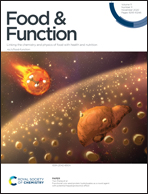Neuroprotective effects of soy isoflavones on chronic ethanol-induced dementia in male ICR mice
Abstract
Chronic ethanol intake can lead to dementia by activating neuroinflammation, causing oxidative stress response, reducing cholinergic function and inducing neuronal apoptosis. Soy isoflavones (SIs) exert beneficial effects in a variety of neurodegenerative disorders by acting on the anti-inflammatory, anti-oxidant, anti-apoptotic and neuro-trophic processes. However, at present, it is unknown whether SIs have a neuroprotective effect in chronic ethanol-induced dementia. The aim of the present study was to investigate the effect of SI on chronic ethanol-induced cognitive deficit in mice and explore the underlying mechanisms. The cognition-impaired mouse model was induced by ethanol (2.0 g kg−1, p.o) for 4 weeks. SIs (10, 20 or 40 mg kg−1, p.o) were delivered 1 hour after ethanol administration for 4 weeks. The Morris water maze (MWM) test and the passive avoidance (PA) task were conducted to evaluate the learning and memory abilities. After the behavioral tests, the biochemical parameter assay and western blot analysis were used to explore the underlying mechanisms of its action. SI administration significantly improved the cognitive performance in the MWM and PA tests, regulated the acetylcholinesterase (AChE) activity and acetylcholine (Ach) level, elevated the synaptic plasticity-related protein expressions and inhibited neuron apoptosis-related protein expressions in the cortex and hippocampus of mice. The results revealed that soy isoflavones may provide a possible novel candidate for the prevention and treatment of alcoholic dementia.



 Please wait while we load your content...
Please wait while we load your content...